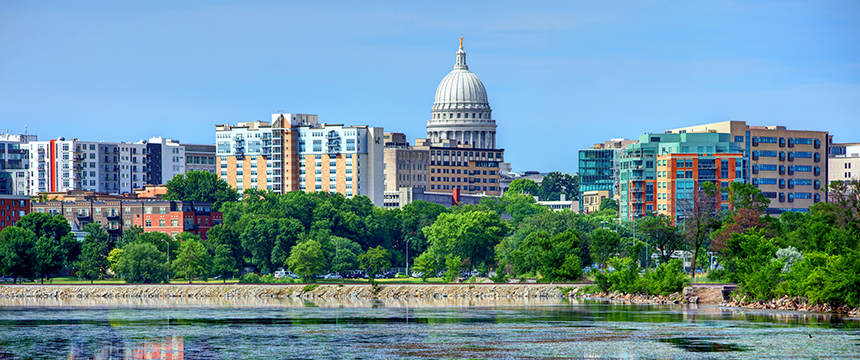
Earlier this afternoon, Governor Evers announced that he had issued a mandatory face covering executive order applicable to all Wisconsinites (age five (5) and older) when they are indoors or in an “enclosed space,” which is defined as a confined space open to the public where people congregate (such as outdoor restaurants, bus stops, and the like). The order includes private and public businesses. There are exceptions, but they are limited. Violation of the order can result in a penalty of not greater than $200. The order goes into effect at 12:01am on Saturday, August 1st, and is set to expire on September 30.
Wisconsin, similar to many states across the country, has seen a recent increase in its positive COVID-19 numbers and overall data. As of July 29, the Department of Health Services (DHS) had reported the following figures:
- 902,440 Wisconsinites tested for COVID-19
- 51,049 Positive COVID-19 results
- 911 Deaths related to COVID-19 (1.8% of all positive cases)
- 4,539 Hospitalizations related to COVID-19 (8.9% of all positive cases)
These figures include and reflect a 7-day average positive test result of 886 (as of July 29), which was slightly down from the 930 7-day average, recorded earlier this week. (The state’s single highest day occurred on July 21 – 1,117 positive cases.) The positive test numbers reflect a positive rate of just over 15.4 persons/100,000 in population in the state. As a result, Wisconsin is one of those “restricted” states on the NY-CT-NJ mandatory travel quarantine list (persons traveling from Wisconsin into NY, CT, or NJ are required to self-quarantine for 14 days upon arrival), and is now also on the Chicago quarantine list as well (meaning – anyone who travels in or from Wisconsin must quarantine upon arriving into the city of Chicago for 14 days upon arrival).
The list of states where mandatory face coverings have gone into effect is over 30 (including Wisconsin), and quickly approaching 35. In addition, there are dozens of larger municipalities that also have mandatory face covering requirements. At least six Wisconsin municipalities already had mandatory face mask requirements in place, including: Green Bay, Madison, Milwaukee, Racine, Superior and Whitewater. And, nearly ten (10) counties in the state already had such mandates in place or were about to implement such mandates.
Governor Evers had repeatedly stated he did not want to implement a mandatory mask order, particularly in light of the Wisconsin Supreme Court’s decision that had struck his “safer at home” order in May. However, the Governor noted that health officials throughout the world, and those in Wisconsin, have continually pointed to mask wearing as one of the most effective ways to slow the spread of the virus.
There seems to be little question that the state’s Republican lawmakers will challenge the Governor’s Order, just as they had challenged his “safer at home” order. That challenge need not occur in the courts; however, if it does, this time around, there has been a slight re-shifting on the Wisconsin Supreme Court with the recent election victory by Jill Karofsky over conservative Justice Daniel Kelly. Justice Karofsy takes her seat in August.
Stay tuned for further updates on the inevitable fight as it moves to the courts of Wisconsin. For more information, contact your Foley relationship partner.
Foley’s here to help our clients effectively address the short- and long-term impacts on their business interests, operations, and objectives. Foley provides insights and strategies across multiple industries and disciplines to provide timely perspective on the wide range of legal and business challenges that companies face conducting business while dealing with the impact of the coronavirus. Click here to stay up to date and ahead of the curve with our key publications addressing today’s challenges and tomorrow’s opportunities. To receive this content directly in your inbox, click here and submit the form.
